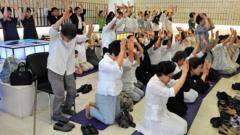In a significant ruling, a Tokyo district court has ordered the dissolution of the Unification Church, frequently referred to as the "Moonies," amid ongoing scrutiny stemming from the assassination of former prime minister Shinzo Abe in 2022. The alleged assassin had claimed grievances related to Abe's associations with the church, asserting that it financially ruined his family.
Japan's education and culture ministry played a pivotal role in seeking the church's disbandment, accusing it of coercively persuading members to make substantial financial contributions and sacrifices. In response, the church contended that these donations were part of legitimate religious practices. The organization can appeal the district court's decision.
As a consequence of the ruling, the church will lose its tax-exempt status and is required to liquidate its assets, though it will be permitted to continue its operations in Japan. During the investigation, authorities uncovered alarming instances of the church pressuring followers to purchase costly items, leveraging their spiritual anxieties. Nearly 200 individuals reported experiences of victimization by the church.
Originating in South Korea, the Unification Church has maintained a presence in Japan since the 1960s. It is notorious for its mass wedding ceremonies that celebrate the idea that marriage is crucial for spiritual salvation. The nickname "Moonies" derives from its founder, Sun Myung Moon.
Recently, around 200 former adherents, claiming they were compelled to contribute financially, have sought 5.7 billion yen (approximately $38.5 million) in reimbursements, according to their legal representatives. Investigations sparked by Abe's assassination revealed deep connections between the church and numerous lawmakers from the ruling Liberal Democratic Party (LDP), leading to the resignation of four ministers. An internal probe found that 179 of the LDP's 379 lawmakers had affiliations with the church, ranging from participating in church events to accepting monetary support.
The extent of interaction between the Unification Church and the LDP has taken Japan by surprise and raised urgent questions about the implications for political integrity and governance.






















